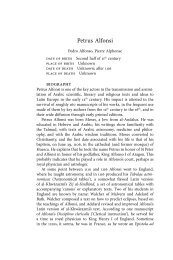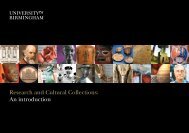reimagining-abstracts - University of Birmingham
reimagining-abstracts - University of Birmingham
reimagining-abstracts - University of Birmingham
Create successful ePaper yourself
Turn your PDF publications into a flip-book with our unique Google optimized e-Paper software.
What do Greek dimensions <strong>of</strong> the problems <strong>of</strong> time, place, language, diaspora,<br />
nostalgia and reciprocity suggest about the theoretical frames <strong>of</strong> classical reception<br />
research?<br />
How does the case <strong>of</strong> Greece contribute to understanding <strong>of</strong> relationships and<br />
disjunctions between scholarly analysis and public and popular modes <strong>of</strong> experience?<br />
Above all, how can understanding <strong>of</strong> the problematic interactions between ancient and<br />
modern Greece be used to help work through the challenges <strong>of</strong> a move from national<br />
to cosmopolitan and global frames <strong>of</strong> investigation?<br />
Eleftheria Ioannidou<br />
eioann@zedat.fu-berlin.de<br />
National Popular Culture and the Classics: Performances <strong>of</strong> Greek<br />
drama under Metaxas’ Regime<br />
Although there had been previous uses <strong>of</strong> ancient spaces as well as quests to establish<br />
Greek drama festivals in modern Greece, Kostis Bastias’ initiatives in this direction in<br />
the 1930s were constitutive <strong>of</strong> a discourse that associated ancient Greek drama with<br />
the popular culture politics <strong>of</strong> the modern Greek nation. The enhancement <strong>of</strong> the<br />
<strong>of</strong>ficial ancient drama festival in Athens [Εβδοµάδες αρχαίου δράµατος], the first use<br />
<strong>of</strong> the theatre <strong>of</strong> Epidaurus in the modern era in 1938, the plans for the building <strong>of</strong> a<br />
large capacity open-air theatre in Athens and the treatment <strong>of</strong> ancient drama on a par<br />
with Shakespeare, were all linked to Bastias’ idea <strong>of</strong> popular performance. The<br />
cultural politics introduced by Bastias regarding the performance <strong>of</strong> ancient drama<br />
will be examined in relation to similar developments in Nazi Germany and fascist<br />
Italy, <strong>of</strong> which Bastias was well aware. The parallels between the three countries can<br />
make manifest that the accommodation <strong>of</strong> ancient drama within institutional contexts<br />
in this period did not just aspire to bring the classics to the people, but it also signified<br />
an attempt to promote forms <strong>of</strong> popular theatre which would refer back to ancient<br />
theatre. However, what in Italy and Germany was mostly related to the rise <strong>of</strong><br />
totalitarian regimes and the cultural politics implemented in order to forge the sense<br />
<strong>of</strong> community, in Greece became further associated to the <strong>of</strong>ficial cultural politics <strong>of</strong><br />
continuity. It is interesting that under Metaxas’ regime this link was supported by a<br />
view about popular culture which vanished in the <strong>of</strong>ficial reception <strong>of</strong> Greek drama<br />
after WWII. It was then that ancient drama festivals became demarcated as the<br />
uncontested realm <strong>of</strong> high culture, while any popular culture elements introduced in<br />
performance are still resisted by both critics and audiences as sacrilegious<br />
encroachments.<br />
Tassos A. Kaplanis<br />
Άπειροι από Έλληνες: Perceptions <strong>of</strong> the Hellenes and the<br />
Construction <strong>of</strong> Ethnic Identity in the Early Modern Greek Period<br />
(12 th -early 19 th c.)<br />
Modern Greek popular culture perceived Hellenes as mythical people with<br />
supernatural powers who did not make part <strong>of</strong> the core <strong>of</strong> the Romeic (= Early<br />
Modern Greek) identity. Recent studies have confirmed that the formation <strong>of</strong> this<br />
Romeic identity must be placed around the time <strong>of</strong> the Frankish conquest <strong>of</strong><br />
Constantinople (1204): the conquest encouraged the growth <strong>of</strong> an Orthodox Christian<br />
identity (with cultural/ethnic characteristics) that became detached and eventually<br />
replaced the political/imperial Byzantine Roman identity. This new ethnic identity, in<br />
the long period from the 13th (when it was decisively formed) to the 19th century<br />
10







![Benyamin Asadipour-Farsani [EngD Conference abstract]](https://img.yumpu.com/51622940/1/184x260/benyamin-asadipour-farsani-engd-conference-abstract.jpg?quality=85)









